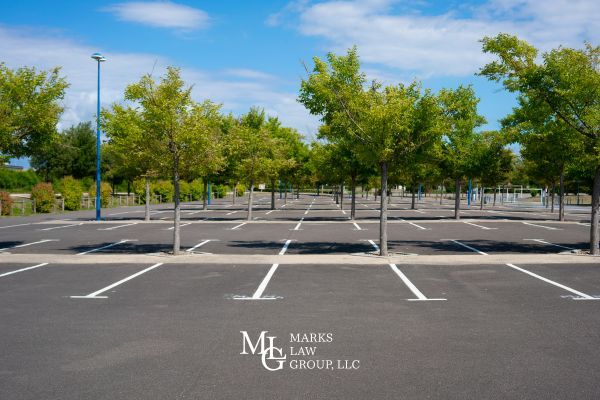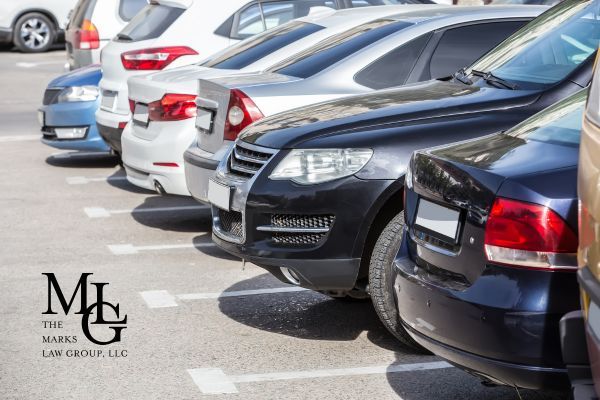Parking lots are a part of our daily lives, but they can present hidden dangers. Whether you're a university student rushing to class or a parent heading into an amusement park, being aware of your surroundings is crucial.
If you or a loved one is hurt in one of these areas, a skilled personal injury lawyer can provide assistance. The good news is that with a few simple parking lot safety tips, you can significantly lower the risk of accidents and stay safe.

Understanding the Dangers in Parking Lots and Garage Structures
It's easy to get distracted in parking lots. Drivers are looking for parking spots, pedestrians are focused on their cell phones, and everyone is in a hurry. This creates a high risk of accidents. Common incidents include vehicles backing out of a parking space and hitting pedestrians, cars colliding in narrow lanes, and slip-and-fall incidents on snow and ice or due to other trip hazards. These accidents can lead to serious parking lot injuries.
Learn more: Marks Law Group provides ecellent representation for slip and fall accidents.
In addition to traffic, personal safety is also a concern. Poor lighting and secluded areas can make you vulnerable to crime. That’s why having a safety plan and being aware of your surroundings is so important.
Dos for Staying Safe in Parking Lots
1. Stay Alert and Aware
Be on high alert from the moment you leave your car until you enter the main building entrance. Look for suspicious activity and make eye contact with drivers and other pedestrians. The National Highway and Traffic Safety Administration provides tips for being a more alert driver, and these apply to parking lots as well.
2. Park in Smart Parking Spots
When possible, choose a well-lit parking space near the entrance or a security officer's post. Avoid parking next to large vans or SUVs, as they create blind spots. If you're parking in a large garage structure, use your GPS system to mark your location.
3. Utilize Vehicle Technology
Use your backup cameras and other security cameras or monitoring systems to get a clear view of your surroundings. Before you put the car in reverse, do a quick risk assessment and check for pedestrians. An organized car can also help you get in and out quickly and safely, especially if you have a car seat to manage.
Did you know? Marks Law Group offers free consultations.
4. Have Personal Safety Tools
Consider carrying a personal alarm or pepper spray to deter potential threats. This is especially important if you are often in secluded or poorly lit areas. Many organizations offer resources on topics like workplace violence and domestic violence, which highlight the importance of safety boundaries in all environments.
5. Report Hazards
If you notice a problem like snow and ice, a large pothole, or poor lighting, report it to the parking attendant or property management. This simple action can prevent future parking lot accidents for others.

Don'ts for Avoiding Parking Lot Injuries
1. Don't Get Distracted
Put your cell phone away. Distracted driving and walking are major causes of car accidents in parking lots. It’s also crucial not to post your location on social media until you are safely away from your vehicle.
2. Don't Assume You're Seen
Always assume that drivers in parked cars or those backing out of a parking space do not see you. Make eye contact and be prepared to stop. This is a crucial aspect of pedestrian safety.
Related: Check out the National Safety Council's safety tips.
3. Don't Leave Valuables in Sight
Keep your belongings, especially valuables, out of sight. Leaving them in plain view invites theft and can create a dangerous situation.

What to Do After an Accident
Even with the best safety precautions, accidents in parking lots can happen. If you're involved in a collision or a personal injury incident, here's what to do:
1. Stay Calm and Assess the Situation
First, check for injuries. If anyone is hurt, call for police officers and medical assistance immediately.
2. Gather Information
Exchange information with the other party. Take photos of the accident scene, including any damage to parked cars and any contributing factors like poor lighting or trip hazards.
3. Call a Professional
Don’t speak to auto insurers or discuss fault with anyone at the scene. Contact a personal injury attorney as soon as possible. A personal injury lawyer can help you navigate the legal process and protect your rights. They will investigate the incident, determine who is at fault, and work to get you the compensation you deserve.
Taking legal action can help you recover from your injuries and get on with your life. Give Marks Law Group a call at (678) 251-9309 today.
FAQs
- What is considered a "trip hazard" in a parking lot?
A trip hazard is anything that could cause a person to trip, fall, or lose their balance. In a parking lot, this can include a cracked or uneven sidewalk, a large pothole, loose debris, or an unmarked speed bump. Property owners have a legal obligation to maintain their premises and fix these hazards. If they fail to do so, and you are injured as a result, a personal injury lawyer can help you explore your options for seeking compensation. - How long do I have to file a claim for a parking lot injury?
The time limit for filing a personal injury claim, known as the statute of limitations, varies by state. In most cases, it is between one to three years from the date of the incident. However, there can be exceptions depending on the circumstances of your case. It is crucial to speak with a personal injury attorney as soon as possible after your injury to ensure you do not miss this critical deadline. - What kind of compensation can I receive for a parking lot injury?
If your case is successful, you may be entitled to compensation for a range of damages. This can include reimbursement for medical expenses, lost wages from time off work, and compensation for pain and suffering. If the property owner or at-fault party was found to be grossly negligent, you may also be awarded punitive damages. A personal injury attorney can provide a full assessment of the compensation you may be eligible to receive.
